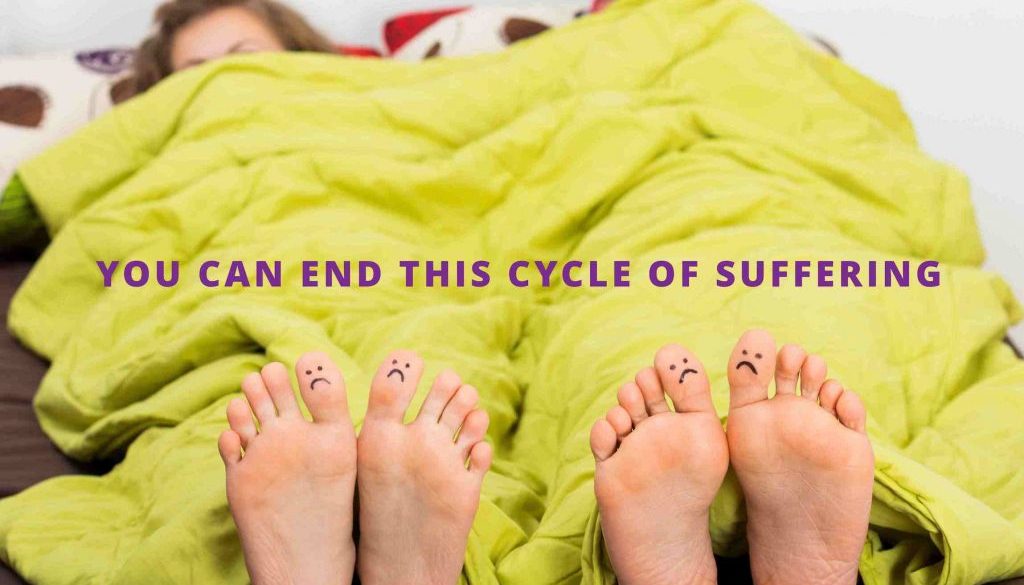The Dynamics of Sexual Dysfunction
He came close to her as if to judge her mood and then moved on to his routine. His hands slowly moved down her stomach and inside her underpants. She wasn’t ready and she didn’t want to do it, she just wanted to close her eyes and drift away. She wanted to say no to him but something inside her didn’t allow her to. And now the only way for her to pretend that she was sleeping. It didn’t work as his hands started to stroke her breasts, while his lips overpowered hers. Soon, her body gave in.
When he entered her, she cringed with a sharp burning sensation and it took her a split second to settle back into the present moment. Sometimes it was just the burning. Other times she felt as if his penis would penetrate her organs as well. Luckily, his erection wasn’t very hard this time. As he moved faster and faster, she tried to breathe harder and harder and make moaning noises. It didn’t take him long to ejaculate, and whilst he laid his head on her shoulders to recover his breath, she kept asking herself about how she truly felt. No answers came as he lifted his head and smirked: “Look at what I have to do to make you happy!”
Was it so? She thought. No answers came.
“Why do you always say that?” she asked, but all she remembered in response was his witty smile.
The woman is this story was me and this was how my married life was. I hated sex and now as I am writing and remembering this, I am feeling really sad. I am feeling sad that I had to endure these painful experiences and I am feeling really sad about how disconnected my partner was (with himself and others) at the time.
This pattern of hating sex and doing it anyway continued for many years. In a way, I was abusing myself by saying yes when every part of me wanted to say No (exactly how I describe it in this blog Are you Sexually Abusing yourself?). Maybe it was part of my healing journey. Maybe I had to experience this pain to come to the other side… who knows!
What I know is that I now understand it more. I understand the dynamics that was at play for so many years in my life and I want to share my understanding in a hope that it may create an Aha moment and shifts for you (if you also feel stuck in this dynamic).
Let’s take a boxing match as an analogy (sounds weird right, but read on…):
Have you noticed that the players walk into the ring “expecting the other player to want to hurt them”?
Both players “don’t trust each other” even before they know each other.
The players walk into the ring fully protected (emotionally and physically).
The players sorta disconnect themselves from their opponent so that they can “hurt” them.
The players have to “numb themselves” to a certain extent so that they can face the pain when hit by their opponent.
Are you starting to see the similarities?
For the abused, all and any “touch” is dangerous because it led to abuse in the past so it will lead to abuse now. They want to protect themselves from this potential of abuse so they “numb/disconnect” themselves.
The partners have their own baggage that they are carrying: it could be the shame of wanting sex; it could be that they feel guilty and sex is their way of coping; it could be their own trauma that they are carrying and are not even aware of it.
In this mode, either it’s about “doing it anyway” or “stop doing it altogether”. Either way, it doesn’t work for any of them. They both stay unhappy, not knowing how to deal with the situation and the withdrawal increases even more.
Fortunately, there is a way OUT of this
And it all starts with communication and education. The more partners learn about each other’s triggers and trauma, more equipped they would be to continue an authentic connection.
Here are the strategies that have worked for me 🙂
Informing Partners of the impact of Trauma
This is such a crucial step in healing. If partners don’t know the impact of trauma then they can’t do anything about it. They may never fully understand it because they haven’t experienced it but if you allow yourself to be seen, they will start to feel the impact through the connection they have with you.
A Conversation about Safety
This was a surprise find. For many men, safety means physical safety. For many women (and especially those who are impacted by trauma), safety has a whole new meaning in terms of its psychological and emotional aspects. Our safety was taken away when we were children and there could be many triggers that bring us back to the same place. It’s so important that our partners understand our triggers and know what to do.
In my case, I told my partner (at the time) to just hold me. I didn’t want him to say anything or ask me questions but just hold me… and he did and it was so powerful. His presence allowed me to open up and heal myself through this beautiful connection that we shared.
Permission to be authentic
This relates to my previous blog Are you sexually abusing yourself?. As women, we are shamed into saying no but men ar also shamed for wanting sex. And this shame carried by both parties becomes evident when the act of sex is happening physically but the lovers aren’t “really” there.
It’s worthwhile to have a conversation about it and work out what would work for both of you.
Safe Touch (with boundaries and respect)
How many times do we actually have a conversation about the act of sex before starting? There is a general impression that things need to be spontaneous and if we talk about it, we will spoil the moment. And What’s the end result? We do things without asking for permission and accept things that we are not okay with.
I am inviting you to have a conversation about it before the act of sex. This conversation is a two-way exchange where you get to learn about each other’s boundaries. This will enable you to have sex that you actually enjoy rather than withdraw.
For me, tickling is one of the big boundaries. I never want to be tickled. but other boundaries are fluid and they change from time to time. I make sure that my partner knows and agrees to respect these and I do the same for him. Then I know that I can let go and surrender to the process of making love because things that are not ok for me, aren’t going to happen.
Letting go of attachment to the end-goal
Many years ago, I asked my partner (at the time) about what sex meant for him? Specifically, I asked if he would consider it “sex” if he didn’t ejaculate. Sadly, his answer was “No”.
This created an interesting dynamic. I felt pressured into giving him “the end-goal’ and it took away the pleasure from the journey. I felt that everything was about “the end-goal’. Through the years, it became clear to me that our society conditions us into thinking that end-goal is everything. Letting go of this attachment seems hard but believe me that it is the most liberating thing I did for myself and you could do that for you.
This freedom allows me to focus on the journey and be present in the moment. The joy is simply ecstatic (for me and my partner both). This is such a big topic that I need a separate blog on this one (and I will write one soon) but for now, I just want to create this possibility that life is fluid and dynamic and it doesn’t follow a formula. And when you impose a formula on it, you may take away the very essence of the act.
This doesn’t mean not ejaculating – it simply means that you take away the expectation and go where the journey goes.
Communication and Sharing
Of course, everything is about communication and sharing. Without it, there can be no healing and no connection.
Seeking Therapy
The trauma is real and its impact is real. To ignore it is to continue the cycle of pain. The healing journey can be hard but I truly believe that if your partner is willing to support you, It’s so worthwhile because both of you will benefit from it.
I send you my love and blessings. I hope that you embark upon this journey with the support of your partner. I hope that both of you are able to create a supportive and enjoyable relationship and I wish you all the best
My love to you
Ruby



